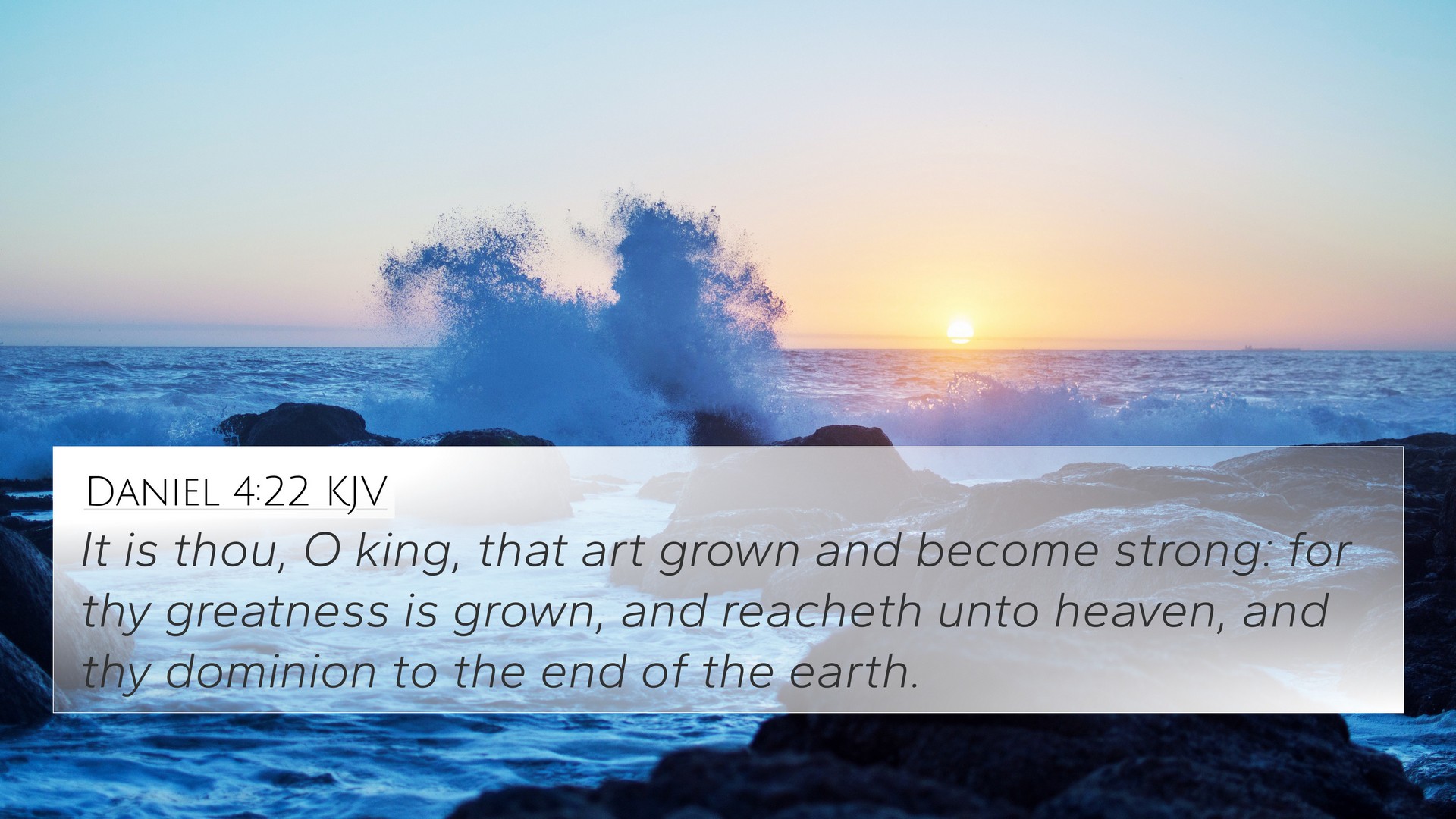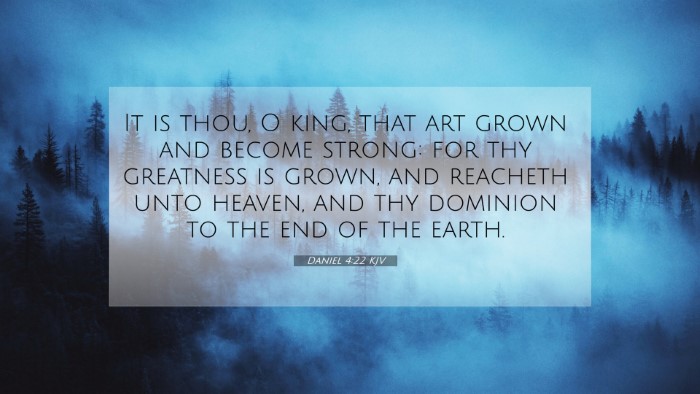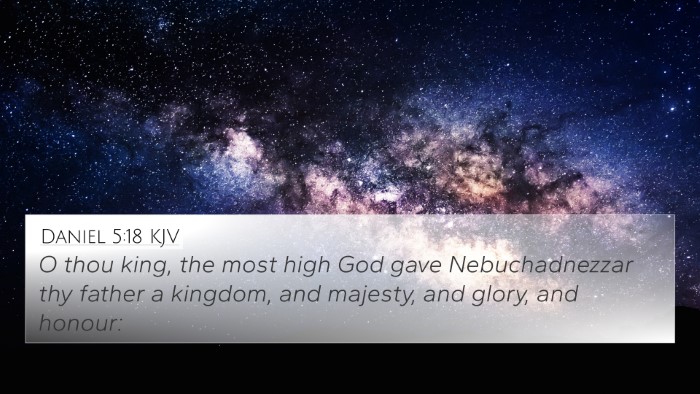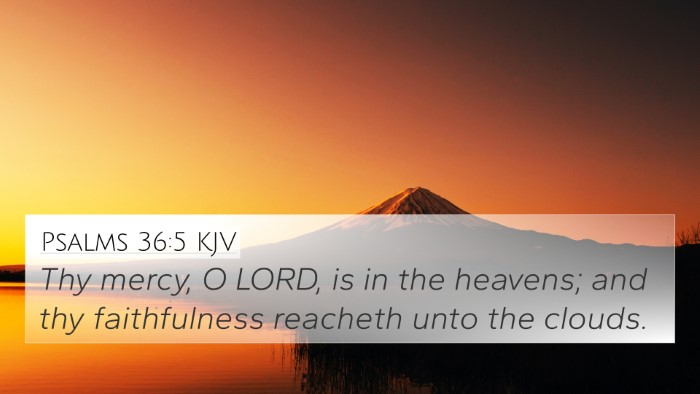Bible Verse Meaning: Daniel 4:22
Verse: "It is thou, O king, that art grown and become strong; for thy greatness is grown, and reacheth unto heaven, and thy dominion to the end of the earth."
In this verse, the messenger of God communicates a message about King Nebuchadnezzar, highlighting his extensive power and influence. The verse serves as a prelude to the prophetic warning regarding his pride and impending judgment.
Commentary Insights
Matthew Henry’s Commentary
Matthew Henry suggests that this verse illustrates the extent of Nebuchadnezzar's dominion. He emphasizes that the king's greatness is a result of God's allowance, ultimately reminding readers of the transient nature of earthly power. Henry points to the divine authority over kingdoms and the ultimate accountability of rulers to God.
Albert Barnes’ Notes
Barnes offers an analysis of the phrase "reacheth unto heaven," indicating the vastness of the influence that Nebuchadnezzar held. He interprets this as a demonstration of the king's overreaching pride, which ultimately sets up the stage for God’s judgment. Barnes encourages readers to understand that no matter how powerful a ruler may appear, they are still under God's sovereign control.
Adam Clarke’s Commentary
Clarke notes the irony in Nebuchadnezzar’s situation, as his strength and grandeur will lead to his downfall due to his failure to acknowledge God's sovereignty. He elaborates on the king’s reign being a temporary state, and this warning serves to remind all who hold authority of their own limitations and the power of God.
Cross-References for Daniel 4:22
- Proverbs 16:18: "Pride goes before destruction, and a haughty spirit before a fall." - This verse complements the theme of pride leading to judgment.
- Isaiah 14:12-15: The fall of Lucifer captures the essence of pride leading to downfall, paralleling King Nebuchadnezzar’s narrative.
- Jeremiah 27:5: “I have made the earth, the man and the beast that are upon the ground, by my great power and by my outstretched arm...” - This stresses God’s sovereignty over all kingdoms.
- Romans 13:1: “Let every soul be subject unto the higher powers. For there is no power but of God: the powers that be are ordained of God.” - A reminder of God’s authority over all rulers.
- Psalm 75:7: “But God is the judge: He puts down one, and sets up another.” - This verse highlights the transient nature of kingship.
- Acts 12:21-23: The account of Herod’s pride and subsequent judgment serves as an illustration of divine authority over rulers.
- 1 Peter 5:5: “God resists the proud, but gives grace to the humble.” - Echoing the warning against pride central to Nebuchadnezzar’s story.
Thematic Connections
The themes of divine sovereignty, the danger of pride, and the nature of power are crucial in understanding Daniel 4:22. This verse serves not only as a historical account but also a profound spiritual lesson applicable across time. The overarching narrative operates within an inter-Biblical dialogue that presents a continuous warning against arrogance and a call for humility before God.
Tools for Understanding Cross-References
To further study the connections between Bible verses, it is advantageous to utilize various tools:
- Bible Concordance: Helps locate specific verses and their occurrences throughout the Bible.
- Bible Cross-reference Guide: Provides links between similar themes and ideas across scripture.
- Bible reference resources: Offer extensive materials that delve into thematic studies.
- Bible Chain References: Connects strings of verses that relate to a specific topic or theme.
- How to use Bible cross-references: Understanding the method for effective interpretation and comparative study.
Conclusion
Daniel 4:22 serves as a critical reminder of the nature of power and pride, highlighting that all authority is ultimately under God’s dominion. Through the insights gained from public domain commentaries, readers can appreciate the depth of this verse and its implications in both historical and modern contexts. The inter-Biblical dialogues established through cross-references strengthen our understanding and application of its teachings.













